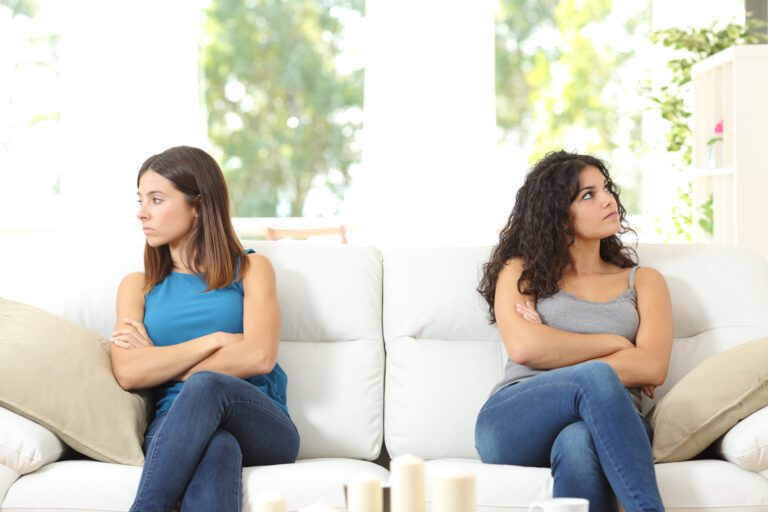Growing up, Liza Joubert, 35, idolised her parents. Dynamic and fun, Joubert considered them to be the perfect role models for her tight-knit family.
So when they told her they were separating, she felt as though her entire world was crashing down around her.
“Our family was a dynamic union and I knew that would be changed forever. The love and kindness shared would now have to be divided in two.”
But there would be no moving between homes for Joubert, nor would she blame herself as children sometimes do. Instead, the life she’d always known – and had planned to share with her future children – was now an illusion. The experiences that formed the basis for her identity were somehow invalidated.
Joubert was in her 20s when her parents divorced. While that meant she was old enough to understand the realities of separation, it also meant the end of life as she knew it.
“It is a shock, I think, regardless of age, but being an adult meant it shattered our whole family, not just our parents,” says Joubert. “Family gatherings are no longer the same and grandchildren will grow up [without] the big happy family I enjoyed; it’s always bits and pieces here and there.”
The impact divorce can have on young children is well documented, with parents all too aware of the repercussions.
Some choose to “stay together for the kids” only to separate later in life when their children are grown and seemingly more able to deal with the realities of their parents’ decision. In fact, divorce post-middle age is on the rise, a trend dubbed the “silver splitters”. In Australia, the divorce rate among adults aged 50 and older doubled between 1990 and 2009, now accounting for one in four divorces.
“With an ageing population people are less likely to tolerate mediocrity, or worse, unhappiness, on a long-term basis,” says relationships counsellor Susan De Campo.
“The main reason people give for divorce when they are older is loss of connection and intimacy. I also think older people are increasingly realising that they have a right to feel happy and fulfilled and that age is not a barrier to achieving this.” So does being an adult make dealing with parental divorce easier?
Identity struggles
As we grow up, our values, personalities and aspirations for our own relationships develop based on our childhood – and often our parents are our greatest role models.
So when the family unit you’ve relied on your entire life is ripped from underneath you, it can be difficult, even traumatic, to accept.
Adult children can be left questioning the memories of their childhood.
With the end of Joubert’s parents’ marriage came the end of an era she thought would last a lifetime, and years of struggle to find her feet and regain her identity.
“I don’t see myself as part of a happy family anymore,” says Joubert. “I still struggle sometimes dealing with it and longing for the close-knit family I enjoyed for [most of my life].
“Nothing is totally in harmony anymore – no birthday or Christmas is enjoyed without longing for a parent that is not there, as I still dearly love both my parents.”
According to De Campo, the notion that adult children aren’t impacted by parental divorce is a myth and staying together for the sake of the children is rarely beneficial. She says while the challenges are different and our coping mechanisms more advanced, the impact – particularly when separation was not expected – can be staggering.
“Younger children are, in theory, more egocentric than adults so they process divorce via a lens of ‘how will this affect me?’ There is also the reality that children are still reliant on parents for their basic life needs and the divorce of their parents may threaten this in some way.”
In that sense, the basic survival skills of adult children are less threatened. On an emotional level, however, it’s a different story.
“There is a nagging sadness about the loss of the so-called fairytale. Along with this sense of loss, there is some curiosity about how long the marriage has been unsatisfactory and why. They also worry that their parents’ divorce somehow translates into an inevitability regarding their own relationships.”
Rather than being spared the details of the relationship breakdown, as children often are, if the break-up has been particularly acrimonious adult children often become embroiled in the drama.
“The advice recommended for parents of young children when divorcing is to not include the children in ‘adult concepts’,” says psychologist Joann Lukins. “This means telling them about the separation, but not drawing them into the conversations as to why, taking sides, becoming involved in the legal logistics…”
According to Lukins, many adult children of divorce are not spared those conversations and may find themselves a key source of support for one or both parents. Rather than being spared from the conflict, they may unwittingly be drawn right into it.
“It is unfair for a child (regardless of their age) to be expected to hear such comments as, ‘I never really loved him’ or ‘I only stayed with her for the sake of you kids’. [These] can leave a person to question their memories of their childhood, and wonder if some of them were fabricated and not genuinely felt.”
Taking Sides
Then there is the issue of being seen to maintain loyalty to a parent in the face of the other starting a new relationship.
Growing up, Cathy Nolan* thought her parents had the perfect marriage. The last thing she expected was a call from her father to say he’d fallen out of love with her mother. Her father is now in a relationship with another woman.
“I thought [my parents] would be together forever,” she says. “I was totally and utterly shocked. Everything that I ever felt was turned upside down.
Newly engaged at the time, Nolan began to reconsider her own relationship and struggled with being caught in the middle of her parents’ feud.
“They had always treated me like a child and suddenly they were treating me like their best and only friend, dumping all their worries on me.
“I was an only child, so my mum, dad and I did everything together. My world was torn apart, I didn’t know what to do or who to turn to.”
For the next year, Nolan struggled as her mother turned to her for support. Her father also struggled with depression and regret.
For Nolan, dealing with the disintegration of her family as an adult has made it all the more traumatic.
“Adults understand way too much. You understand a lot more about relationships and parents don’t hide anything from you – they bitch about each other, tell lies and you [are] stuck in the middle.
“As a child I think you are sheltered from this. There’s also a lifetime worth of memories and it’s sad to think about times that were and will never be again.” Of course as adults, we also have an increased ability to process situations and the skills required to adapt to new realities, but it’s important to acknowledge our own feelings throughout the process.
Making progress
De Campo says trying to manage changed family dynamics as well as working through your own emotions can be challenging.
“It’s important not to make assumptions about what divorce in the family may or may not mean for other family members,” she says.
Focusing on your own feelings and working through them at your own pace is paramount. “In every so-called crisis situation there is the opportunity – at some point – for personal growth.”
And while understanding why our parents have divorced can be confronting, it also has some value, says De Campo.
“It can help us deal with any guilt we might feel regarding our part in the divorce.” Unfortunately it can also invite us to take sides, which can cause irrevocable damage to relationships.
De Campo says it’s crucial to focus on your own feelings first in order to avoid taking sides – and there’s no shortcut to doing that. “Get professional help if you need to. It’s kind of like, you can hate the divorce but still love the parents.”
According to Lukins, it’s also important to find positives during adversity.
“It may be an opportunity to get to know one or both of your parents better. Adversity is always an opportunity for strength and growth and it may cause you to work harder at your own relationships.”
After years of soul-searching and personal growth, Joubert is slowly coming to terms with the separation of her family. Although she still misses “lazy Sundays in the garden” with her family, she no longer blames her parents.
“You are ultimately responsible for your own happiness – love, being kind and offering support without judgement, builds bridges over large separations.
“Although my parents’ divorce has left a permanent scar, I think both parties are in harmony again and our family has adapted to the life of having two separate families.”
The fallout
For Cathy Nolan, her parents’ divorce has damaged her relationship with her father, who has chosen not to attend her upcoming wedding.
“My dad won’t come to that because we won’t let his girlfriend come,” says Nolan.
“When I was a little girl I fantasised about my future wedding, my dad walking me down the aisle and having a picture taken with both my parents. I know that will never happen now.”
While Nolan’s relationship with her mum became stronger after her parents split, her once-close relationship with her dad has changed.
“He is dating a woman with an eight-year-old son and I have found it really hard to adapt to this – to me it feels like my dad is starting a new family and forgetting about me.
“It is my wedding in just over a week and my dad won’t come to that because we won’t let his girlfriend come. He told me, ‘I choose her over you’. This really hurt.”
Nolan is still coming to terms with the changes in her life and says being an adult hasn’t made her parents’ separation any easier.







